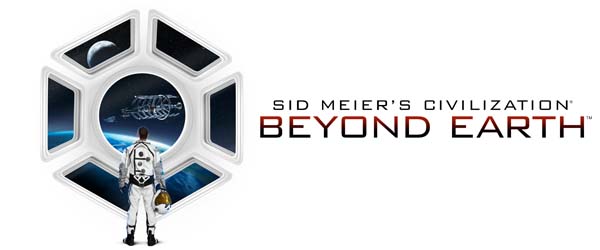
I started writing this post months ago (back in 2015, I think) - long before I had any inkling of the impending release of Civilization VI. This post may be entirely moot now that Civ VI has been announced, and it seems unlikely to me that Beyond Earth will see further expansions. However, I still want to present these ideas, so I've re-written this post to be less speculative and more retrospective. Even if these ideas aren't fated to be implemented for Beyond Earth, it's still an opportunity to look at a way in which the game could have differentiated itself from Civ V, and they could serve as a template for future Civ titles (maybe even Beyond Earth 2) or for modders. Maybe I'll even mod it in myself if I get time and motivation.
Civilization: Beyond Earth really struggled to separate itself from Civ V. The expansion, Rising Tide takes steps to address this with some of its new gameplay mechanics and revised diplomatic engine. Sadly, these efforts don't really address one of the underlying, fundamental, disconnects that the game has with me:
"One of the things that bothered me about Beyond Earth was the way that the victory conditions create an unnecessary competition between the different civs. Aren't we all just colonists from the same earth who are supposed to be trying not to repeat the mistakes of the past? Aren't we trying to preserve the human race? Without the various civs starting the game with any sort of pre-established ideology or agendas, there's no reason for them to be competing with one another. Without a genuine shared victory, there's also no systems in place to share your colonial success with your fellow colonies. The net effect is that once you've defeated the challenge of taming the planet and [one way or another] eliminating the aliens as a threat to your expansion, then the rest of the game is a competition between civs to be the first to reach any of the [mechanically satisfying and varied, yet intellectually vapid] victory conditions."
- from my Rising Tide review
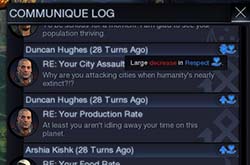
Heck, why are we competing to begin with?
Despite being mechanically different from Civ V's victory conditions, Beyond Earth still fell into the trap of being fundamentally, unnecessarily tribalistic and competitive. I don't know if this is supposed to be some kind of sad, fatalist message that Firaxis is writing into Beyond Earth: that we are doomed to repeat the mistakes of the past. This isn't Fallout. I hope that Firaxis' designers aren't that cynical, and that it was an unintentional emergent consequence of design.
This may seem like a small, trivial, superficial issue, but it's not. Regular Civilization is easy to buy into because it's based [loosely] on established history and uses real-world characters and states that most people are already familiar with. Buying into the theme of Beyond Earth is just so much harder because there's so much of the game that just doesn't make sense, or which doesn't really follow from the opening cinematic or the game's flavor text. This is why Alpha Centauri went to such great pains to personlize the leaders, and to turn them into charicatures of established real-world ideologies and standard sci-fi tropes. These are factions with established goals and agendas that we can understand, and we can buy into their conflicts. Beyond Earth doesn't have that, and so not only do its leaders fall flat as characters unto their own, but the entire basis upon which the game's core conflicts and victory conditions are based start to fall apart as well.
In any case, I think that one of the best ways that Beyond Earth could have truly separated itself from Civ V (mechanically and thematically) would have been to change the competitive nature of the victories and introduce truly cooperative victories, or maybe even a "players versus map" victory type. And I want to emphasize from the start that I haven't put nearly as much time into Beyond Earth as I have into Civ V. I'm by no means an "expert" in the game. So feel free to take the following suggestions with a grain of salt. I admit that these ideas simply might not work, but I still think that it's worthwhile to explore the possibility space that this game could have offered... [More]
41c56220-e572-46c7-b911-40df5b0b6ab2|1|5.0
Tags:Sid Meier's Civilization, Civilization: Beyond Earth, Civilization: Beyond Earth: Rising Tide, Firaxis, 2K Games, PC, Steam, strategy, grand strategy, turn-based strategy, science fiction, space, victory, cooperation, alliance, harmony, purity, supremacy, contact, first contact, domination, board game, Battlestar Galactica, Pandemic, Arkham Horror, Mansions of Madness, Descent: Journeys in the Dark
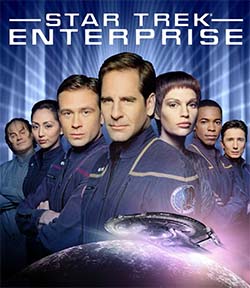
Star Trek: Enterprise is a very divisive topic among Trekkers / Trekkies. Personally, I'm not a big fan. It was a perfectly adequate space adventure TV show, but just never quite worked as hard science fiction for me, let alone as "Star Trek". There were certainly some stand-out good episodes. The haunted space station of "Dead Stop" and the mirror universe antics of "In a Mirror, Darkly" being among my favorites. The annoying thing is that the show made several mistakes at very fundamental levels before it even got off the ground. I could have lived with the show being a prequel, but the efforts to make the show seem both futuristic to the viewing audience, but also less advanced than the (then 40-year-old) original series put the show in an awkward juxtaposition with established series continuity. The hackneyed time travel meta-plot certainly didn't help.
"Juxtaposed" is an excellent way of describing Enterprise as a whole. It's a show that simultaneously seemed ashamed of its "Star Trek" name (remember, it premiered with the title "Enterprise", and "Star Trek" was only stapled back on in later seasons), while also indulging in needless - and sometimes cringe-worthy - fan service (such as the appearance of the Borg, Ferengi, and the entire episode "In A Mirror, Darkly"). It wanted to distance itself from established Trek tropes, but also brought back many of the same technologies, concepts, and character archetypes (simply renaming many of them). It set itself at the cusp of development of advanced science fiction technologies, but completely waffled when it came to telling hard science fiction stories about those technologies. It wanted to be simultaneously a prequel and a sequel via its contrived time travel premise. It was this lack of confidence and true vision that really killed this show.
The science of future technology
The show made the mistake of trying to present a Star Trek setting that was less technologically advanced, but still went ahead and gave the crew access to stand-ins for all the established trek technologies. They tried to make the Enterprise itself feel more like a contemporary submarine with its confined spaces, but it never really felt different. There was "hull polarization" instead of shields, and "phase cannons" instead of phasers. Different names, but same basic concepts that were used in exactly the same manner. The crew didn't start the show using more contemporary-seeming projectile weapons - not even a futuristic projectile weapon like a rail gun - before transitioning to purely energy-based weapons. The Enterprise didn't have to be equipped with any kind of futuristic chaffe in order to misdirect hostile targeting scanners, nor did it use point-defense to destroy incoming missiles.
"Phase pistols" and "polarized hull" were just lazy stand-ins for phasers and shields.
The only pieces of tech that the show really held off on (and were relevant to narrative) were the universal translator and transporters. The translator was rarely an issue since Hoshi was practically a Babel Fish. The transporter was there, but it was not trusted to reliably transport living things - even though it had been verified as safe by the beginning of the first episode and was successfully used in that episode. So for most of the show's run, the crew used shuttle craft for away missions, but the transporter was always there just waiting to act as a deus ex machina to get the crew out of a sticky situation (which, of course, happened on multiple occasions - including the premiere).
The fact that these technologies were already in place made the show feel too similar to other Trek series, even though it desperately wanted to feel distinct. But it also prevented the writers from exploring some of the more interesting issues inherent to the development of these technologies... [More]
da55494b-5a7b-4e89-b139-99295c419ad0|2|3.5
Tags:Star Trek, Star Trek: Enterprise, Enterprise, mirror universe, Terran Empire, Jonathan Archer, Borg, Ferengi, Xindi, time travel, xenophobia, science fiction, technology, transporter, phaser, universal translator, Heisenberg Compensators, artificial gravity, centrifugal force, space, allegory, Zefram Cochrane, Star Trek: First Contact, first contact
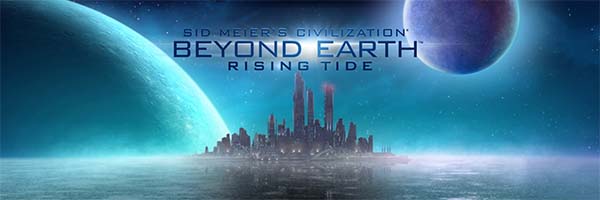
I'm starting to feel like quite the prognosticator. Earlier this year, I started tossing around the idea of Nomadic civilizations for future Civ games. Around the same time, Creative Assembly announced Attila: Total War. They had apparently come up with almost the same idea independently at the same time. Well, now the teams at Firaxis have also implemented a variation of my idea for their new expansion to Beyond Earth, called Rising Tide.
This expansion seeks to remedy several of the core complaints with the Beyond Earth game. In my original review for Beyond Earth, my two biggest complaints were that the game and its leaders lacked the personality and variety of Civilization V, and that it just didn't feel futuristic enough. Both of these complaints ended up being the major focus of the first expansion, which definitely helps to make Beyond Earth stand out a little bit from its more realistic counterpart.
So we sailed up to the sun, till we found a sea of green
One of Beyond Earth's biggest failings was its lack of creativity in using its futuristic setting to innovate gameplay. The game felt very much like a reskin of Civ V rather than a new game. A big part of this was that the map posed many of the same sorts of restrictions on players that the Civ V map did: mountains, canyons, and oceans were all obstacles either impassable by units or uncolonizable by cities.
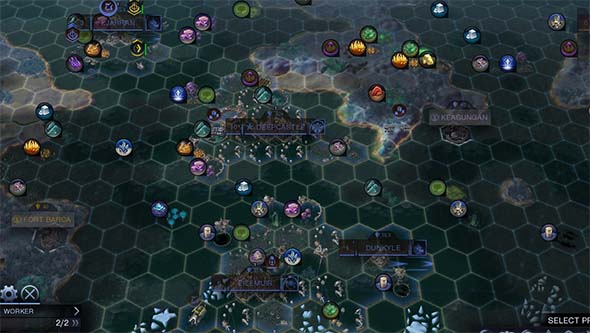
Aquatic cities and civilizations help to separate Beyond Earth's futuristic setting from Civilization's historical roots.
Well now one of those restrictions has been lifted, and civilizations can build floating cities in the oceans. Such cities can even be moved in order to claim new tiles or to act as mobile military bases. This opens up some interesting (and sometimes silly) new strategic possibilities, but the whole mechanic feels a bit contrived to me. Moveable cities is something that I think can work very well in Civilization, but I just don't feel that Firaxis gave us much reason to ever need to move cities in this game. My proposal for nomadic civilizations was two fold: such a faction could mobilize its entire civilization right up to an enemy's borders during war; and it could also move in response to changing map conditions (migrating animal resources or climate change) during peace. Beyond Earth hits that first point by turning cities into massive aircraft carriers, but there aren't any mechanics in place to make the map a factor.
Fish and other harvestable sea creatures don't migrate, and other resources don't move. So if you aren't using your aquatic cities as mobile military bases, then there's never any real need to move them. And if you're not playing as the North Sea Alliance faction, then the cost to move a city can feel prohibitively expensive. The people at Firaxis seemed to have recognized this, and so they made it so that aquatic cities don't grow their borders based on culture. Instead, you must either buy new tiles or move the city itself in order to acquire adjacent tiles. But since moving takes valuable production time away from the city, I rarely find myself moving a city, and instead I just buy any tiles that I want.
Aquatic cities can be moved, and can act as mobile military platforms and aircraft carriers.
There are other pros and cons to aquatic cities, such as health benefits, faster virtue acquisition, and more profitable trade routes. You can also move the cities around to temporarily acquire resources that allow you to build specific resource buildings, but at the cost of possibly temporarily hurting your city's growth or production (and maybe even starving the city if you move away from food-generating tiles). So there's a lot to think about when build an aquatic or nomadic civilization, but it all feels kind of like ad hoc mechanics in order to make the mechanic seem more meaningful than it actually is. That isn't to say that mobile cities is a bad feature in Beyond Earth. It's perfectly functional, and can be fun to play around with. It just feels a little gimmicky.
Just look at the world around you, right here on the ocean floor
It certainly helps that the oceans themselves are a much bigger part of the game. The ocean isn't just divided into coastal tiles and empty ocean anymore. There's a whole host of new aquatic resources, and even the sea floor itself has different features. This definitely provides some incentive and reward to building floating cities, since the ocean can be a rich source of resources. The ocean tiles themselves can even be improved with a variety of new improvements (including basic farms and mines).
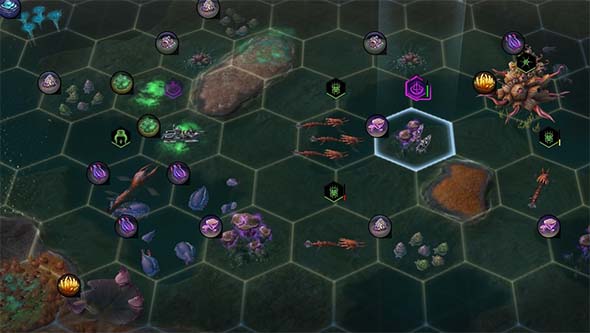
The oceans are alive with life and resources, giving reason to found aquatic cities.
Aliens are also active in the oceans. Sea creatures will build nests (just like their land counterparts), and there's a new alien creature called Hydrocoral that is stationary but which spreads across the ocean surface if left unchecked. Resource pods, artifacts, and quest triggers can all also be found in the ocean. So there's plenty to do in the water now, oceans feel more like a genuine part of the map rather than just dead space between continents, and the variety of features and resources in the ocean helps to make the world look more alien.
... [More]
da86c697-6def-4ade-b575-051869e1f38d|2|5.0
Tags:Sid Meier's Civilization, Civilization: Beyond Earth, Civilization: Beyond Earth: Rising Tide, Rising Tide, Firaxis, 2K Games, PC, Steam, strategy, grand strategy, turn-based strategy, science fiction, space, water, aquatic city, nomad, ocean, trench, submarine, diplomacy, affinity, alien, Civilization: Beyond Earth

Since I have some extra time off for this holiday season, I'm trying to go through some of my backlog of shorter indie Steam games in between bouts of Cities: Skylines and Beyond Earth: Rising Tide. One such game is Facepalm Games' 2013's sci-fi indie hit, The Swapper, which I picked up in a Steam sale like a year ago. The game has also been ported to many consoles, including the PS3, PS4, Vita, XBox One, and Wii U, and the ports were developed by Curve Digital.
Making my clones do the deadly work
The Swapper seems to owe a lot to Valve's mega-hit Portal. Both games' central mechanics revolve around the player character using a futuristic non-weaponized gun (with 2 settings) to solve platforming puzzles and explore an environment. Portal is in full 3-D, whereas The Swapper is a more traditional 2-D side-scroller. The bigger difference however, is that the gun of The Swapper doesn't fire portable wormholes; instead, it allows the player character to instantly create clones of herself, and to swap her consciousness into one of the clones. Once created, these copies move in tandem with the copy that is currently being controlled by the player. The key to the puzzles is to maneuver yourself so that your clones can reach otherwise inaccessible areas or activate switches.
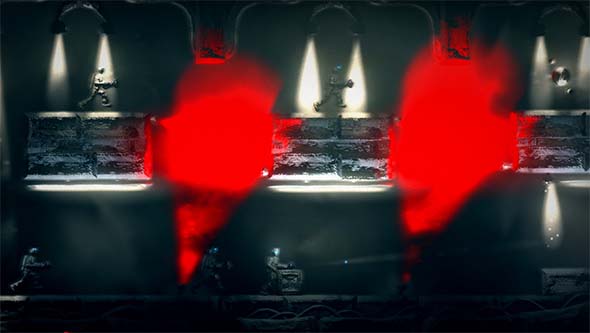
All your clones move in synchronization, making relative spacing very important for solving puzzles.
The space station is laid out in an unbelievable, but serviceable, series of puzzle rooms joined together by modest platforming sections. At first, the platforming between puzzles is interesting because it kept me thinking along the lines of solving puzzles rather than just moving from place to place. But there's a lot of exploration and backtracking, and having to navigate the corridors between puzzle rooms quickly became tedious once using the swapper gun became second nature and automatic. Fortunately, the game provides handy teleporters to allow you to quickly move to key sections of the station, so the backtracking never became as problematic as it could have been.
The puzzles themselves start off fairly simple, requiring that the player simply point the gun and clone herself in order to reach a platform or cross a gap and collect alien orbs that you use to unlock new areas of the space station. The challenge quickly escalates. Soon, obstacles start getting thrown at you, such as colored lights that prevent certain operations of the swapper gun, forcing you to have to find more elaborate ways around the lights in order to reach your destination. You have to start using careful positioning, choreographed movement, gravity, momentum, and inertia in order to successfully solve the puzzles. And all this escalation seems to happen naturally based on the increasing complexity of the levels, rather than through the introduction of new mechanics or controls.
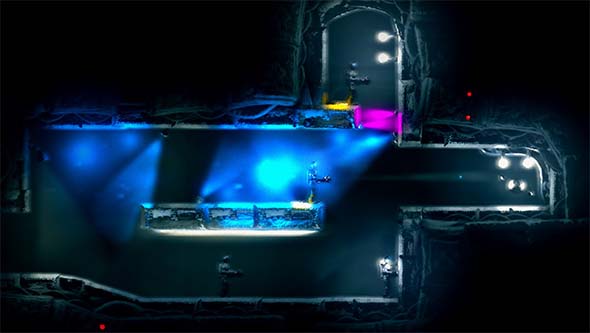
About an hour into the game, I ran into a puzzle that took almost an hour of trial-and-error for me to solve.
About an hour into the game, the difficulty suddenly spiked, and I ran into one puzzle in particular that took me quite a while to figure out. I even had to leave it and come back to it later with a fresh perspective. I thought maybe I was missing some kind of upgrade or needed to learn some technique that the game hadn't tutorialized yet, but that wasn't the case. Eventually, I figured it out, and the solution seemed head-smacking obvious, but I probably spent a good hour on that one puzzle (approximately half of my time with the game, up to that point).
There are also some other sci-fi mechanics such as the occasional zero-g spacewalk, gravity inversion (allowing you to "fall" up and walk on the ceilings), and so on. These all flow fairly seamlessly into the game; although, I did feel that the gravity inversion felt a little unnecessary when it was introduced. After all, the game teaches you fairly early how to use the swapper gun to effectively fly by repeatedly swapping to clones created above you. This "flying", is, however, limited by the number of clones that you can create, and it's still subject to being blocked by colored lights. So gravity inversion felt superficial when introduced as a means of navigating the station. Once the gravity inversion was introduced into the puzzles, though, I recognized its value.
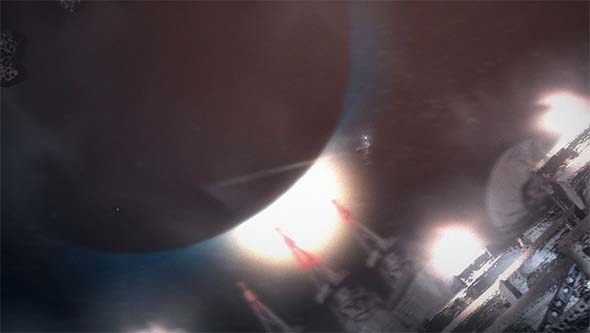
You'll also perform the occasional zero-G spacewalk or invert gravity.
Any problems that I had in solving a puzzle were purely intellectual. Every control and mechanic is intuitive and comfortable, movement is responsive, and I almost never struggled with making the character do what I wanted her to do. All in all, the game plays near-perfectly. The puzzles are appropriately challenging; although, the exploratory nature of the game means that difficulty can wobble back and forth a bit depending on which puzzle rooms you reach first... [More]
8b3a77a8-4dc7-429b-b9ce-44d928af9f86|2|5.0
Tags:The Swapper, Steam, indie gaming, puzzle, platformer, science fiction, cloning, consciousness, identity, self, brain, mind, mind-body problem, space, sentient, alien, Portal

I dropped the ball on this one. I often criticize Hollywood for not being willing to make genuine, hard science fiction movies anymore, and I begroan the continued bastardization of my beloved Star Trek and the dumbed down action flicks that Hollywood dared to put the "Star Trek" title on. The studios say that science fiction don't make enough money. Apologists say that casual audiences are too dumb and impatient to sit through any kind of slow-developing, cerebral movie. Ironically enough (despite my own frequent cynicism) I think both these apologetics are too cynical and don't give audiences enough credit. I firmly believe that if the studios make a good movie, the audiences will go see it, especially if it's properly marketed.
So when a thoughtful, science fiction movie like The Martian comes out, I try to make a point of spending my money to see it in order to show my support for the continued development of the genre. I made a point of seeing Gravity, despite that movie appearing to be little more than space destruction porn and iMax eye candy. I also made sure that I saw last year's Interstellar. And both of the Planet of the Apes reboots have been surprisingly excellent. Unfortunately, I lost track of the release date of The Martian and missed seeing it on opening weekend (one of Hollywood's biggest metrics of a movie's success). I also wasn't able to see it the week after, or the week after that due to my weekends being consistently busy. It was over a month before I finally put my foot down and said "I'm seeing this movie now! No more delay!". And then I went and saw it twice in that same weekend.
Fortunately, the rest of the country vindicated me by heaping dump trucks full of praise on the movie and putting their butts in the theater seats to keep The Martian at the number 1 spot in the box office for almost the entire month of October (only briefly falling to number 2 for one week behind Goosebumps - really?). It finally took an upteenth sequel to a beloved franchise to topple The Martian when Spectre (which I also saw this weekend) held the top spot for two weeks in a row. The movie itself is earning Oscar buzz, and Matt Damon seems to be the current favorite for "Best Actor". So there you have it, Hollywood: make a good sci-fi movie, and they will come, and they will love it.

Matt Damon's character is charming and easily has the audience rooting for him against all odds.
And the movie is absolutely fantastic! It's ambitions are closer to Apollo 13 than to 2001: A Space Odyssey. It's a very believable, down-to-earth, science fiction film, the events of which feel like they could happen tomorrow. Matt Damon's performance is absolutely charming as a NASA astronaut stranded on Mars and presumed dead when his team is forced to evac due to a violent sandstorm... [More]
07512981-d696-4a06-9ee6-d639a967a128|0|.0
Tags:The Martian, Matt Damon, Ridley Scott, science fiction, Mars, space, NASA, astronaut, Ares, Pathfinder, optimism, Oscar
|

| 12 | | | | | | | 60 | | 11 | | | | | | | 55 | | 10 | | | | | | | 50 | | 09 | | | | | | | 45 | | 08 | | | | | | | 40 | | 07 | | | | | | | 35 | | 06 | | | | | | | 30 | | 05 | | | | | | | 25 | | 04 | | | | | | | 20 | | 03 | | | | | | | 15 | | 02 | | | | | | | 10 | | 01 | | | | | | | 05 |
|